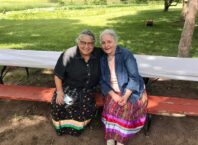Aquila Tapio (Oglala Lakota) will be the first student to recieve her master’s degree from Augsburg College’s new Naadamaadiwin, "Helping One Another" Tribal Special Education program.
Tapio began her studies after moving to the Twin Cities when she was 18. Her initial two-year degree led to a four-year degree from the University of Minnesota, then a paralegal certificate from Hamline University and finally a teaching certificate and a forthcoming master’s degree from Augsburg College. Tapio is currently enrolled in her final course.
Used to juggling many tasks, Tapio and her husband, Shawnee Hunt, have three daughters between the ages of 14 months and 10 years. Hunt is from both the Leech Lake Pillager Band of Ojibwe and the Ho-Chunk Nation of Wisconsin. Early in their marriage they participated in foster care for two years, caring for a total of four children. The foster parent experience highlighted the importance of special care and education for Tapio.
Tapio’s Tribal Special Education program runs in a cohort format and is a joint venture between Augsburg College and the University of Minnesota Duluth. The flexibility of online learning with the added support of face-to-face sessions was one of the key factors that attracted Tapio to the program.
As her first foray into online learning, she said she found it to be simpler than expected. "The professors offer a blend of talents in cultural and special education experience. They are also willing to learn about Native experiences from their students," says Tapio.
After earning her teaching license in emotional/behavioral disorders and learning disabilities, Tapio went to work at the Minneapolis Public School District in Indian education. Her job is to encourage student engagement for success and increase parent engagement to the school community. Tapio’s success stems from understanding the background and circumstance of each individual child to create a total picture. She works with about 135 students in two elementary schools in the district.
Challenges arise for Tapio from communication levels on both the teacher and student side of the equation. For example, if a death occurs in a Native American family, a student is likely to be out of school for a week or more. Communicating cultural traditions with the teacher and getting homework assignments before the absence help bridge expectations on both sides.
Tapio notes that many of her students have a desire to do something that is Native, to be acknowledged and to be valued. She tries to make sure that the first few communications home are positive ones for Native American parents.
As a final master’s project, Tapio will study materials that empower parents to work more productively with teachers. An increased comprehension of Native American history, the importance of a welcoming community atmosphere, and understanding the background of each child are areas in which teachers can benefit. Parental benefits center on the importance of active participation in school activities and their rights regarding special education.






